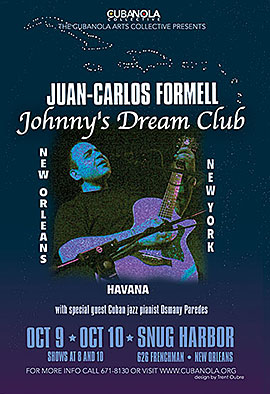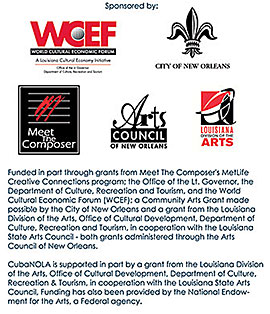The CubaNOLA Arts Collective presented
grammy-nominated Cuban composer/guitarist/vocalist
Juan-Carlos Formell
for the CD release of his new album "Johnny’s Dream Club" which was recorded in New Orleans in April 2008.
The concerts commemorated the important Cuban holiday - "el 10 de octubre" (10th of October) - which marks the beginning of Cuba's war of independence from Spain.
On October 10, 1868, Carlos Manuel de Céspedes freed the slaves on his plantation in Eastern Cuba and, along with other planters,
proclaimed the independence of Cuba in the historic Grito de Yara. Cuba’s independence depended upon uniting all Cubans against Spanish rule, and the Cuban masses changed the character of the revolution into a democratic one that sponsored abolition.
"Johnny’s Dream Club" is Formell’s fifth album and was recorded in New Orleans in April 2008. Named for a legendary Havana jazz cabaret of the late 1950s, Johnny's Dream Club represents a place outside of time, the vortex of the tumultuous force field between New Orleans and Havana, where the parallel lines of Cuban music and American jazz converge.
The album was produced by John Fischbach at his Piety Street recording studio. The concerts featured a stellar musical line-up including - Cuban jazz pianist Osmany Paredes, Argentinean bassist Pedro Giraudo, Cuban percussionist Jorge Leyva, and Latin jazz virtuoso Lewis Kahn on trombone and violin.
Cuban composer / guitarist / vocalist Juan-Carlos Formell is a 4th generation musician, now based in New York, part of what he calls "a generation in exile." His four critically-acclaimed albums reveal a rare ear for new compositions which meld a sense of tradition with a groundbreaking and powerful writing style that has been acclaimed as "the magical realism of music."
Formell conjures a delirious swirl of juxtapositions: intense, rhapsodic compositions ("Ciudad", "Caliban") evoking the nightmare of a destroyed city, flow into tone poems about the Cuban rafters escaping to the sea ("Las islas son malvadas", "Cuando hable de la noche"); the tormented and bloody history of the Caribbean ("Yanbando") is set against layered, allusive jazz ballads ("Sotavento", "Ciego Amor") inspired by Havana’s "Feeling" movement of the 1940s.
He described this album as "a reflection of our culture today — in the post-modern landscape, we are all refugees from the lost city, haunted, adrift at sea, in danger of losing our true reference points, and losing our way forever. I came back to New Orleans to make this record because I believe that here, at the crossroads of the Caribbean, it’s possible to create music that embraces the past while gazing at the future, a new music without genres and categories."
CubaNOLA hosts 9th Ward party featuring Juan-Carlos Formell


